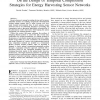Free Online Productivity Tools
i2Speak
i2Symbol
i2OCR
iTex2Img
iWeb2Print
iWeb2Shot
i2Type
iPdf2Split
iPdf2Merge
i2Bopomofo
i2Arabic
i2Style
i2Image
i2PDF
iLatex2Rtf
Sci2ools
TWC
2016
2016
On the Design of Temporal Compression Strategies for Energy Harvesting Sensor Networks
— Recent advances in energy harvesting devices and low-power embedded systems are enabling energetically self-sustainable wireless sensing systems able to sense, process, and wirelessly transmit environmental data. In such systems, energy resources need to be judiciously allocated to processing and transmission tasks to guarantee high-fidelity reconstruction of the phenomenon under observation while keeping the system operational over extended periods of time. Within this context, this paper addresses the problem of designing efficient policies to control the task of lossy data compression for wireless transmission over fading channels in the presence of a stochastic energy input process and a replenishable energy buffer. As a first contribution, the transmission and energy dynamics of a sensor node implementing practical lossy compression methods are modeled as a Constrained Markov Decision Problem (CMDP). Then, an algorithm is designed to derive optimal compression/transmission ...
TWC 2016 |
| Added | 11 Apr 2016 |
| Updated | 11 Apr 2016 |
| Type | Journal |
| Year | 2016 |
| Where | TWC |
| Authors | Davide Zordan, Tommaso Melodia, Michele Rossi |
Comments (0)

